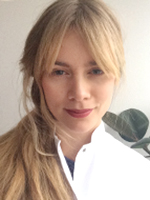
Meet Maj—rebooting our immune system to fight cancer.
Q: What is your current role in health research?
A: I am pursuing my PhD on translational cancer research with the Department of Experimental Medicine at the University of British Columbia (UBC). Most of my daily work takes place at the Vancouver Prostate Centre (VPC) where I am privileged to be part of a transatlantic research collaboration between the labs of Dr. Mads Daugaard at VPC and Dr. Ali Salanti at the University of Copenhagen.
Q: How did you become interested in research?
A: To me, cancer is a fascinating, yet fear-inducing, phenomenon. I am intrigued by how cancer develops and what factors contribute to its progression. In particular, I am interested in cancer immunology research and how we can help the immune system regain its natural ability to fight cancer cells. I strongly believe that to fight any complex malady, including cancer, we must not limit ourselves to one research branch. Seeking inspiration from seemingly unrelated biological peculiarities is the key to innovative research. The pivotal basis of my project is rooted in utilizing a malaria parasite derived protein to detect cancer cells. We load this protein with different immunostimulatory molecules to activate the immune system locally in the tumor. How great would be if we can use one detrimental disease to fight another?
Q: What is the best part of your research job?
A: People. I love when new ideas arise from social interaction. Exchanging ideas allows us to achieve something we would not have been able to attain on our own. The result of collaboration is my favorite part of doing research.
Q: What has been the biggest highlight or proudest moment of your research career so far?
A: Being invited to speak at the Danish Parliament about talent development was one of the biggest moments of my still young career. I gave a presentation on the connection between personal and scientific growth at the Parliament house, highlighting my belief that a playful approach to science is imperative to maintaining the excitement for research and innovative discoveries.
Q: What is the best advice you’ve received in your career?
A: As a scientist, I am still learning the best ways to stay focused, prioritize and multitask. The most helpful advice I have received is to differentiate between what is essential and vital to do, from what is trivial or merely good to do. Keeping this thought in my head allows me to prioritize commitments and tasks in my work and personal life. I am better equipped to remove obstacles to achieve what is important.
Q: How do you unwind at the end of the day?
A: In the winter time I practice yoga and in the summer I travel to Gambier Island, where my better half and I are building a cabin.



